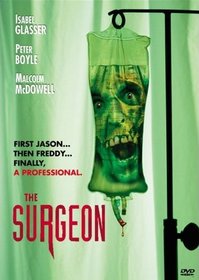Our editor-in-chief Nate Yapp is proud to have contributed to the new book Hidden Horror: A Celebration of 101 Underrated and Overlooked Fright Flicks, edited by Aaron Christensen. Another contributors include Anthony Timpone, B.J. Colangelo, Dave Alexander, Classic-Horror.com's own Robert C. Ring and John W. Bowen. Pick up a copy today from Amazon.com!
The Surgeon (1995)
Although it's able to slice through many deservedly obscure flicks with a scalpel while feeding them acid through an IV, The Surgeon, or Exquisite Tenderness as the inappropriate-sounding alternate title has it, is oddly underrated by most horror fans and deserves wider recognition.
Directed by Carl Schenkel, The Surgeon is a film with German roots (to add to the confusion, it is also known as The Beast in the White Smock and Infernal Torments in German, although it was filmed in English). I agree it isn't the most intellectual work ever (although it's far from the least intellectual), and it's understandable that it hasn't won any awards (although that has as much or more to do with the mentality of awards than the quality of this film), but hey, it's a horror flick. For me to consider it a decent film, I don't ask it to do much more than provide some atmosphere, some tension, an entertaining story, a monster of some sort, and some gore (or at least implied violence if an old flick), while having decent production values. The Surgeon does all that and much, much more.
The story begins in the 1950s in a sequence filmed in beautiful, crisp, black and white (the cinematography is excellent throughout the film). A family has rushed their son to a doctor's home, where the doctor decides that the boy is in need of emergency surgery, which he performs in a back room. The doctor doesn't take necessary precautions--either because he's incompetent, insane, or a bit of both, and he botches the surgery and "accidentally" kills the boy. The boy's brother is nearby and sees his brother dead on the cold, metal table. There's also a bit of poetic imagery here involving an actual lollipop while the song "Lollipop" plays in the background, silly as that may be in the grand scheme of things.
That's our prologue, and it quickly cuts to the present, where we see a beautiful physician (Isabel Glasser, as Dr. Theresa McCann) begin a very bad day as she arrives for work at a hospital. She runs late to a lecture by Dr. Stein (Malcolm McDowell), who is demonstrating an experimental technique on a baboon. The baboon goes nuts in the middle of the lecture then dies. We find out Dr. McCann has been protesting Dr. Stein's experiments with hospital administration, but we soon learn that something much more sinister is going on.
My synopsis is purposefully sketchy because at least the first third of The Surgeon plays as much like a good mystery as a horror film. Just as I've left it open, Schenkel and scriptwriters Patrick Cirillo and Bernard Sloane skillfully leave you wondering for quite some time just what the connection between the film proper and the prologue is. Refreshingly, the mystery aspect doesn't consume the whole of the film. Rather, a complete explanation of the backstory is layed out for us about halfway through (with some help from The Surgeon's other big name, Peter Boyle, as Lieutenant McEllwaine) and the rest of the film lies in a comfortable niche between horror and thriller.
Maybe the genre bending/melding is what throws some folks off. Instead of being a flaw, though, it is one of The Surgeon's foremost strengths. Whether intentional or not, Schenkel's realization of the film through various genres never seems contrived or like he's unsure where he wants to go, instead it seems like an argument for the futility of genre categorizations, as the story flows smoothly and naturally throughout the film despite the clear classification. Other factors that some might cite as flaws are the mild silliness of the backstory (the title Exquisite Tenderness also happened to be the title of a dubious thesis written by our villain on his experimental research) and the gratuitous nudity and sex. On the other hand, the reason most of us like horror isn't because we think all the plots, if any, are realistic, and most of us actually like at least a smidgen of gratuitous nudity and sex. I can't see horror fans citing those elements as flaws.
The cast all give equally strong performances, and the direction is impeccable. The other technical elements are far above average, and the story sure kept me on the edge of my seat. Part of that might be that one of my real-life fears is of medical procedures. The Surgeon had me cringing many times at the sight of the various medical tortures that our villain puts his victims through. Plus, despite the fact that the backstory/thesis takes a generous attitude to believe, this is one of the few films that actually gives a solid reason, within the logic of the film, for the villain to "come back to life" at the end -- that in itself should up it a point or two, and it is indicative of the attention to craft that Schenkel displays with this fine film.








